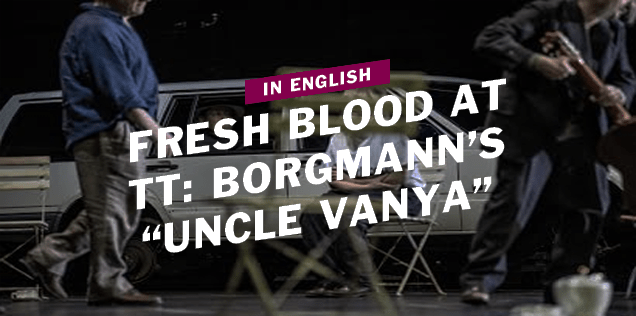Be it from a lack of imagination or for structural reasons, the Theatertreffen’s jury tends to choose the same directors to present their most “remarkable” works, year after year.
In this context, new directors who are welcomed to the club are specifically exciting.
Two newcomers this year: Susanne Kennedy, whose Fegefeuer in Ingolstadt premiered on Wednesday, and Robert Borgmann with his Uncle Vanya, a Chekhov classic. The illustrious Russian author is an old friend of the festival, the second most “invited” author after Shakespeare.
Borgmann’s „Uncle Vanya“ – the seventh Uncle Vanya in the history of the Theatertreffen – surprises with its intended slow rhythm, its unexpected, strong images and its free rearrangement of the text in the second part. “You could never ever imagine such a free interpretation in an English-speaking country!”, claims my neighbour, a theatre professor from Canada preparing a comparative book about stagings of the classics.
One image sticks in my head after the show: a handful of characters, speaking very slowly, surrounded by a Volvo car that makes even slower circles around them. The car seems to be in a perpetual motion and the characters are completely stuck. That feeling is emphasised with repetitive music – brilliantly composed by Webermichelson – and underlined by never-ending sounds of cicadas. Disappointed characters that can only lie to each other: the beautiful young Yelena (Sandra Andrejewna), playing badminton with a member of the audience wrapped in an silken American flag, is bored of her relationship with old Prof. Serebryakov (Elmar Roloff), who is full of himself. They are staying at a rural house that belonged to Serebryakov’s first wife, managed after her death by her daughter Sonya (Katharina Knapp) and her brother, the titular Uncle Vanya (Peter Kurth), and frequently visited by misanthropist Dr. Astrov (Thomas Lawinky).
The evening starts slowly and speaks slowly. It is incredibly depressive and boring – like a mediocre July 4 barbecue party in an American suburb. With this intended lethargic rhythm, described as a “brave choice” by Jury member Christoph Leibold, Borgmann loses some members of the audience by the end of the first part and wins the others forever. Once your watching adapts to the character’s lethargy you are getting rewarded with an in-depth understanding of the dynamic of their state of mind. Borgmann’s associative freedom of interpretation is a delight, especially within the minimalistic scenery including an old Volvo, neon lights and characters appearing from the ceiling.
“When I’m reading the text,” he explains, “images are the first things that occur to me – like this one moment when Vanya comes from the sky. Some can be pretty absurd, then I put them together and it makes sense. At that point my imagination starts filling these images with characters.” Those are played quite freely as well by the excellent ensemble of Stuttgart, going from very theatrical exaggerations to almost naturalistic play. “This freedom was entirely part of the working atmosphere,” explains actress Katharina Knapp. “Every morning we would start the day with joint yoga. We were developing such a trust amongst us, that everything was allowed and tried out.”
And a lot was tried out: not only does Vanya actually appear from the ceiling but Yelena shouts half of her text in extravagant costumes, Sonya declaims alone – with the help of loudspeakers responding to her – the whole fourth act before the third begins while the rest of the cast is confined to the Volvo, and Vanya suddenly invents himself a tragic past quoting, in a long monologue, another Chekhov short novel, The Fear. Some of those trials work better than others but all in all, this Uncle Vanya leaves you with a deep impression. Probably with the help of Borgmann’s great talent for endings, be it Yelena’s hysterical show on the rooftop of the car in the dark before the break, or the fantastic ending of the play (spoiler alert!): as everyone is gone and Sonya and Vanya, left alone to their miserable destiny, both are sitting still and Sonya is loudly cutting her nails, waiting for better days.
“I have to watch it again on TV,” concludes my second neighbour, an older lady who is seeing half of the Theatertreffen’s plays. After being very disappointed by the first part – „I was never ever bored by a Chekhov play!” – she admitted to have actually liked it after the second part ended. You can catch the TV programme along with her on Saturday, May 17 at 8:15pm on 3sat or enjoy the festival atmosphere for free by attending the public screening at the Sony Center Potsdamer Platz on Sunday, May 11 at 4pm.
Notice: Three plays will be screened for free at the Sony Center: you can also attend “Fegefeuer in Ingolstadt” on Friday, May 9 at 7pm and „Cement“ on Saturday, May 10 at 4pm (my quick review here). Although „Cement“ and „Uncle Vanya“ were shown onstage with English surtitles, those probably won’t be readable on the video – so if you’re not fluent in German, you’d better (re-)read your classics before you go.
Exberliner is partner of the Theatertreffen-blog
